
Issue 104 March/April 2024 Familiesonline.co.uk Education Easter Parenting FREETakeMeHome IN THIS ISSUE BWS_Families_Banner_180x40.indd 1 BWS_Families_Banner_180x40.indd 2 17/08/2020 29_01_24 Join us to find out just how far your child could go. EYFS & Prep Open Morning 20th April, 10am-1pm Call today or visit bridgewater-school.co.uk/register-open-morning to reserve your place .




Families Manchester 2 A fun-filled Easter family day out! Sat 23 Mar - Sun 14 Apr eureka.org.uk Scan here! Book for our Eco Explorers event! EUREKA.ORG.UK Scan Here to book online!
Editor Karen Sykes editor@familiesmanchester.co.uk
01706 671664
Printed by Buxton Press
Design by Rebecca Carr
Next issue: May/June
Book by: 12 April
Families Manchester and Cheshire is available through nurseries, schools, libraries, selected shops and other points throughout the region. If you would like FREE copies for your organisation, please get in touch.
In this issue
4.
9.
10.
12.
14.
16.
The paper used in this magazine is made with or contains forest-based materials from FSCcertified forests and its use will not have harmed forests.
Welcome
CONTENTS
Is there a touch of spring in the air? If not quite yet, then definitely very soon. It’s time to come out of hibernation and reembrace the great outdoors as nature comes back to live.
To help you do that, we have some fabulous walks from our friends at The Outdoor Guide (www.theoutdoorguide.co.uk) as well as some great nature activities you can use to motivate your kids to enjoy walking! And make sure you get out your calendar, go through our What’s On section and put in some of the great events and activities going on locally.
Easter is just round the corner so as well as planning egg hunts, don’t forget to cut out and keep our Easter craft so you can get have an activity for the kids to do as they get ready for the Easter bunny’s visit!
We also have some fabulous articles about education in this issue, including how to help your child develop a positive attitude to learning. Discover more about Auditory Processing Disorder and focus on find out how to easily support your child’s learning outside of the traditional homework routine.
Finally, in this issue, we have Sea Monkeys prize bundles to giveaway! Apply for six inside. By doing so, you’ll also ensure you receive our digital magazine with lots more content and goodies on offer.
Karen Editor, Families Manchester
Families is a registered trademark of LCMB Ltd, Remenham House, Regatta Place, Marlow Road, Bourne End, Bucks SL8 5TD. The contents of this magazine are fully protected by copyright and none of the editorial or photographic matter may be reproduced in any form without prior consent of Families Print Ltd. Every care is taken in the preparation of this magazine but Families Print Ltd, its distributors, franchisees and LCMB Ltd cannot be held responsible for the claims of advertisers nor for the accuracy of the contents, or any consequences thereof.
‘A vibrant and welcoming community’

Familiesonline.co.uk Families Manchester 3
Education
years Outdoors Parenting What’s On Easter craft ‘cut out and keep’ Tel: 0161 456 9000 www.stockportgrammar.co.uk STOCKPORT GRAMMAR SCHOOL An independent school for children ages 3-18 years Assistance with fees available at 11+ and 16+ (means tested), academic and music scholarships FOUNDED IN 1487 Book online for: Junior School & Nursery Open Event 11th May Senior School Taster Days for Year 5 children 22nd May, 23rd May and 19th June Junior, Senior and Sixth Form school day tours
Early
ISI Inspection 2023
School wobblies –keeping reluctant children in school
By Lisa Wander and Catherine Noble
Anxiety about going to school affects about five percent of children in the UK. Part of normal development in young children, it becomes more concerning if it doesn’t pass over time. If your child is refusing school due to anxiety, the longer this continues, the harder it becomes for them to return.
Missing school not only means your child loses out on education but also other essential skills, such as mixing with their peers and becoming more independent from their parents. School attendance is, in fact, mandatory: under UK law parents are responsible for ensuring their child attends school. However, in 2022, more than sixteen thousand parents were fined for unauthorised school absences.
A variety of factors can be behind a reluctance to attend school. Young children often experience separation anxiety or may be anxious by temperament. Some children may experience difficulties at school with friendship group dynamics or feel intimidated or inferior. Others may find the work challenging and the pressure to perform well overwhelming. Difficulties at home or illness may keep them away from school. Commonly it is a combination of some or all of these things that creates anxiety and may lead to the arrival of the ‘school wobblies.’
How to identify ‘school wobblies’
The feelings your child may experience are real and this anxiety can lead to physical symptoms such as sweating, headaches, feeling sick or an increased heart rate which can make them
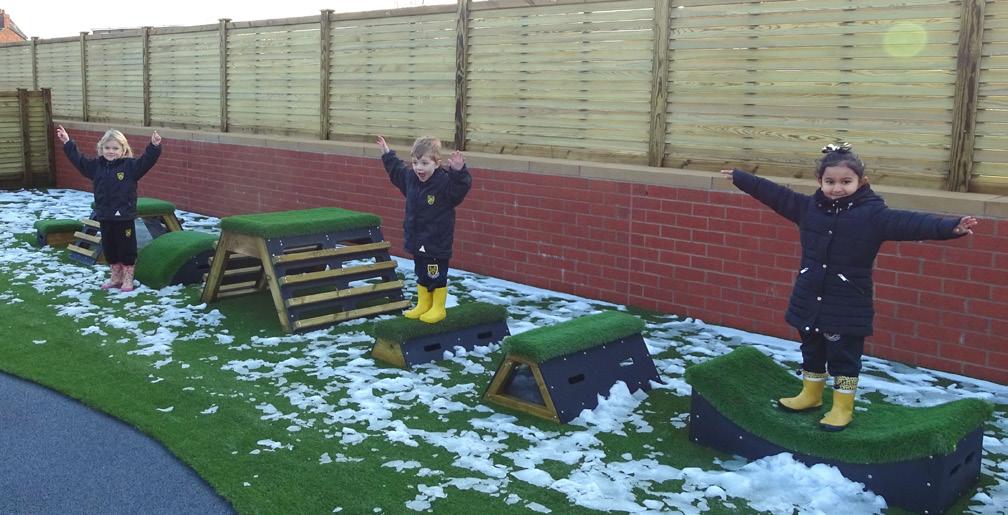
‘Vibrant and welcoming’ at Stockport Grammar
A few months ago Stockport Grammar School was extra busy with a visit from the Independent Schools Inspectorate (ISI) as part of their routine programme of inspections. The results are in and Stockport Grammar met all the ISI standards and the report is full of praise for the school. Some comments include ’quality of education, pupil wellbeing and co-curricular activities. ‘Vibrant and welcoming community’ ‘children are happy and thriving’ ‘teaching is stimulating and elicits enthusiastic responses’ ‘an extensive selection of cocurricular activities’ ‘pupils are interested and motivated in their learning’ ‘well prepared for life beyond school’
The full report can be read on the school website.
Head Mrs Sarah Capewell said “All of us at Stockport Grammar School have such pride in and love for the school and therefore we welcomed the opportunity for a team of inspectors to visit. It is wonderful, although not a surprise, that they identified many of the things that make this such an amazing community to be a part of. It is indeed a ‘vibrant and welcoming community.”
Find out more at www.stockportgrammar.co.uk

feel dizzy. Children may be reluctant to get up and ready in the morning. They may be angry and upset or acting out at home or they may withdraw and seem quiet and low, often fixating on small issues. These are all automatic and mostly normal reactions.
However, it’s important to bear in mind that for every missed school day, it becomes harder for your child to go back. For some children an occasional day off could be the best thing but, for an anxious child, this can make things much worse. So try not to give in and keep continuity.
School reluctance requires a nuanced and empathetic approach. By understanding the root causes, fostering open communications and implementing positive strategies, parents and educators can work together to create an environment in which children feel supported, confident and eager to embrace the opportunities that schools offer.
Lisa and Catherine are co-founders of Emparenting (www.emparenting.co.uk), supporting children, parents and families with the insights, skills and tools needed to nurture the development and well-being of the next generation.
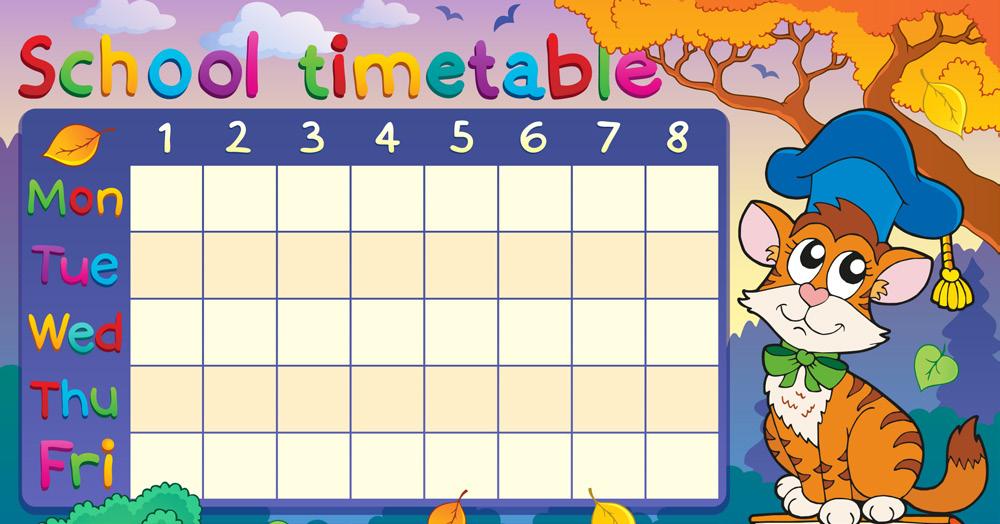
A personalised support plan
Once you understand the root of your child’s anxiety, work with their school to create a personalised plan of support and schedule regular progress meetings. This plan may include:
Taking your child in earlier to school to meet with a known key adult or friend to ensure a calm start to the day.
Providing a visual timetable to give a clear structure to the day, including support when moving between lessons. Where possible, ensure your child is informed about changes.
A safe space to retreat to and opportunities for brain breaks. Activities and clubs at breaktimes to provide structure. A specific responsibility can help them feel involved.
An in-school Social Skills Intervention Group to embed positive friendship habits.
Practising mindfulness and relaxation techniques to help calm an anxious mind.
Familiesonline.co.uk Families Manchester 4 EDUCATION
Learning Forest School skills
By Jemma Z Smith
‘How was school today?’ a parent asked their child. ‘It was amazing: we all worked together to build a den; we played hide and seek in the woods and toasted marshmallows on a real fire!’ the child enthusiastically responded.
This was a conversation I overheard in the playground after my first Forest School session with my Year 3 class. No mention of the new method of addition that we had worked so hard on using manipulatives; no rendition of the funny poem that we had been reading in English that had us all laughing as we acted out the different verses.
Was I disappointed? Not one bit.
Learning outside the box
My class was the first class at the school to ‘do Forest School’ and they (and the adults) loved every minute of the afternoon.
Some people might question ‘losing’ an afternoon’s learning within a packed, timetabled curriculum. I’d respond that rather than loss, the experience was in fact very beneficial to helping these children, preparing them in general for life beyond education.
Teamwork, communication skills, risk analysis, trying things outside your comfort zone, resilience and independence are just a few things that my class of 7 and 8-year-olds learned that afternoon and they continued to learn and make progress in these areas throughout their time at primary school.
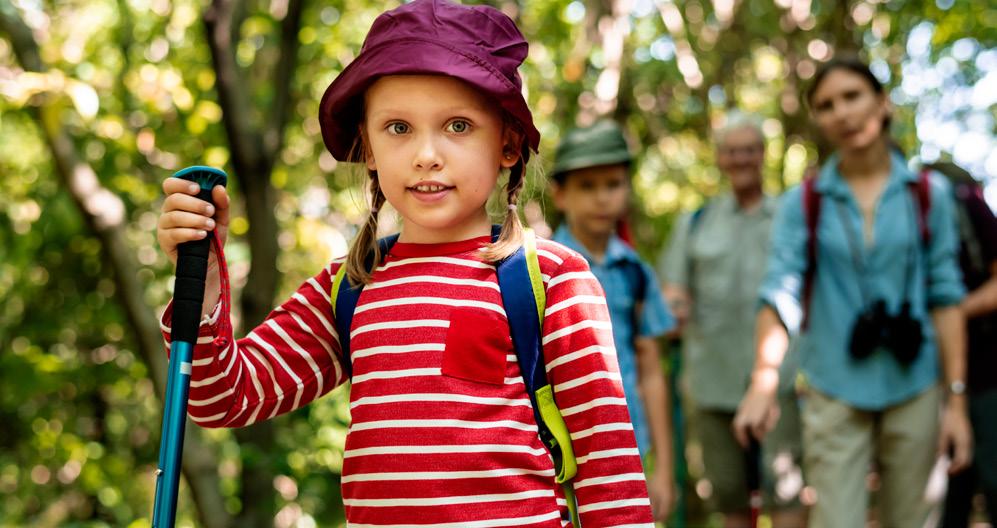
Finding your own outdoor learning
Your child’s school may not have Forest School opportunities on offer to all children but there are lots of private providers out there who run enriching after school and holiday clubs. You may even find them advertising in this magazine! Alternatively, a quick search online will usually yield a list of providers in your local area.
Even simple activities, like taking a walk in your local park, can offer outdoor learning opportunities: your kids can take note of the different leaves on the trees and research them when you get home or using an app on an adult’s phone. They can take photos of the different colours of nature at different times of year, look out for animal footprints and play ‘hide and seek’ with their friends and family - I bet the children are much better at this than the adults!
Being outdoors offers so much learning potential and like all good learning opportunities, when a child is having so much fun that they don’t realise they are learning, all the better.
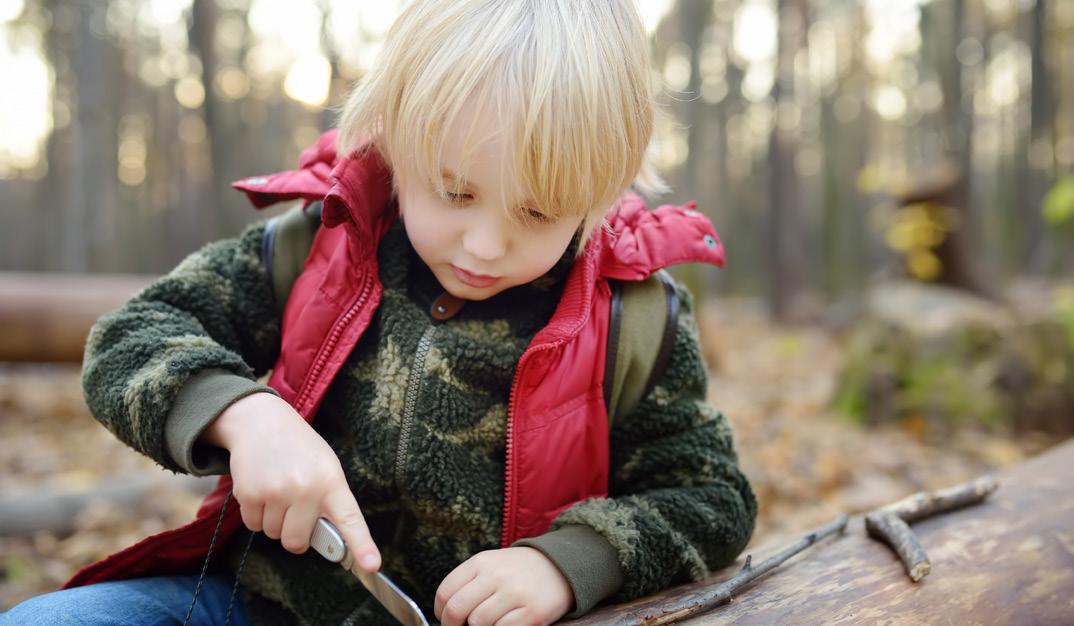
New experiences
For some children, Forest School and learning outside the classroom can seem scary and unfamiliar. They may not have as much access to the outdoor environment as previous generations and this needs to be handled sensitively. Such children can still learn the skills and also enjoy everything that the environment has to offer, when led by adults who are aware of and respond to how they are feeling in a way that helps them get the most out of the opportunity.
Making it work
Not every school has access to a forest or woodland area but they can still embrace the ethos of Forest School and it can be adapted in so many ways. You don’t have to have a real fire to sing songs in the round and you can be creative in an art or music lesson and take it outside!
Jemma Z Smith is Director of The Education Hotel. For further advice, visit www.educationhotel.co.uk

Become an
Would you like to host and teach English to a foreign student in your home ?
We are currently recruiting hosts who can offer a spare bedroom, 3 meals per day and the required lessons and activities
You choose when to host and who to host !
Payment from £500 to £800 per week
Get in touch to find out more:
www.influentme.com
host@influentme.com
Familiesonline.co.uk Families Manchester 5
EDUCATION
Influent Host Teacher!
Packaging learning
By Zuzu Jordan
Benjamin Franklin’s famous quote ‘tell me and I forget, teach me and I may remember; involve me and I learn’ captures the essence behind true learning.
This may be why encouraging your own child to WANT to sit down to learn can feel like an impossible task at times, with parents often questioning how their child is able to sit, concentrate and learn at school.
Covid lockdowns thrust homeschooling onto families. Parents had to take on the role of teachers, experiencing the complexities surrounding learning, while children faced the need to respond differently to their parents as teachers.
Being in a classroom in a school setting, rather than at home, helps children grasp that a different set of rules apply. In fact, in schools, they conform simply because the majority do - children are excellent at policing each other!
There has been a rise in the number of families who choose to homeschool, many of whom have developed effective strategies to create a learning environment at home. Whether you want to homeschool, support homework or just nurture a love for learning, a deep dive into the working mind of a child can offer ways to package learning.
Understanding that learning is something that occurs through experiences or acquiring knowledge and skills, we can usefully engineer situations and scenarios to facilitate this. These techniques can package learning as inviting and exciting.
Use toys. This applies for children of all ages. For example, Nerf guns are great at firing at answers to times table questions or spelling. Scrabble tiles are also fantastic for practising spelling. Foam letters or numbers in the bath are fun for both spelling and maths questions.
Go into the wild. There’s so much learning to be done in the great outdoors: making rain gauges, following maps, gardening, studying wildlife and classification.
Question of the week. To encourage independent thinking, at the start of the week pose a question which doesn’t have an obvious answer. For example: ‘Who built the strongest buildings - Romans or Saxons?’ Developing curiosity in children is key to packaging learning.
Celebrating achievements

This is the fun, rewarding and essential part of parenting, increasing self-esteem and motivating children to keep learning. Try these:
The Tate Modern allows children to upload their own artwork for display in the online gallery (www.tate.org.uk/kids).
Some maths apps have pre-made certificates. For example, Whiterose 1 Minute Maths App (www.whiteroseeducation. com/1-minute-maths)
Blue Peter Badges are fantastic way to celebrate children’s work. There are a number of badges your child can apply for and they even get your child into some attractions for free!

Computer games. The settings and characters in welldeveloped computer games are designed to entice children. This can be good for enhancing creative writing skills.
Emailing experts. Consider setting your child up with an email address so that they can email an ‘expert” in a chosen topic to find out more. For example, if they are learning about volcanoes, they could email a vocanologist.
Book and movie comparison. Turn a movie session into a learning opportunity. Watch the film and then read the book or vice versa. Compare their similarities and differences.
Reading dogs. There’s a lot of research that suggests that children’s reading improves if they read to pets. It’s as simple as that!
Treasure hunts. Children love finding things. Plant words, numbers, sentences, objects and questions around the house and send children to find them.
Board games. A lot of learning can come out of playing board games. Create your own board game linked to your chosen topic.
Current issues - whether environmental, social or political. Find something that your child is passionate about. Write letters, research, devise fundraising events.
Zuzu Jordan is a Mastery for Maths specialist who has taught primary aged children for sixteen years and is interested in early years and home learning. For free homework and home learning resources, find the Facebook page Edumateuk.
Cross curricular
learning

Cross curricular learning links subjects together, allowing children to find patterns and connections, thus developing and deepening their knowledge of a subject. For example, writing a diary entry in the role of someone in Ancient Roman times embraces English and history and is therefore a cross curricular activity.
This type of learning helps enforce key knowledge and make subjects meaningful. Cross curricular links are particularly important in maths as they provide context for their mathematical problems.
Familiesonline.co.uk Families Manchester 6 EDUCATION
Understanding Auditory Processing Disorder (APD)
By Usha Patel
Those with Auditory Processing Disorder (APD) have normal hearing but constantly mishear what is said. Whilst APD is neurological in nature and may be inherited or stem from developmental problems, research shows that early childhood ear infections can be a significant contributory factor.
Children develop critical language skills between the ages of 6 months and 3 years, when the brain learns to map out and store sounds for language processing. When a child starts reacting to words with a smile or starts speaking their first words, they are effectively associating these sounds with meanings.
If a child suffers from constant middle ear infections during this critical period, the ability to process language and speech can be affected. Sounds which normally become imprinted in the brain’s memory and language centres are not properly established. The mishearing happens because the brain recognises aural information differently from what the child actually hears.
For example, when children can’t differentiate between thirteen and thirty. Whilst hearing can be perfectly normal, the brain just cannot process those sounds correctly due to their similarity. This inability of the brain to accurately process what is heard results in the Auditory Processing Disorder condition (APD).
APD is often difficult to diagnose in children as they may have other learning difficulties such as dyslexia, attention deficit disorder or dyspraxia (DCD), which may mask the condition. It also cannot be diagnosed with standard hearing tests; it requires specialist audiology testing.
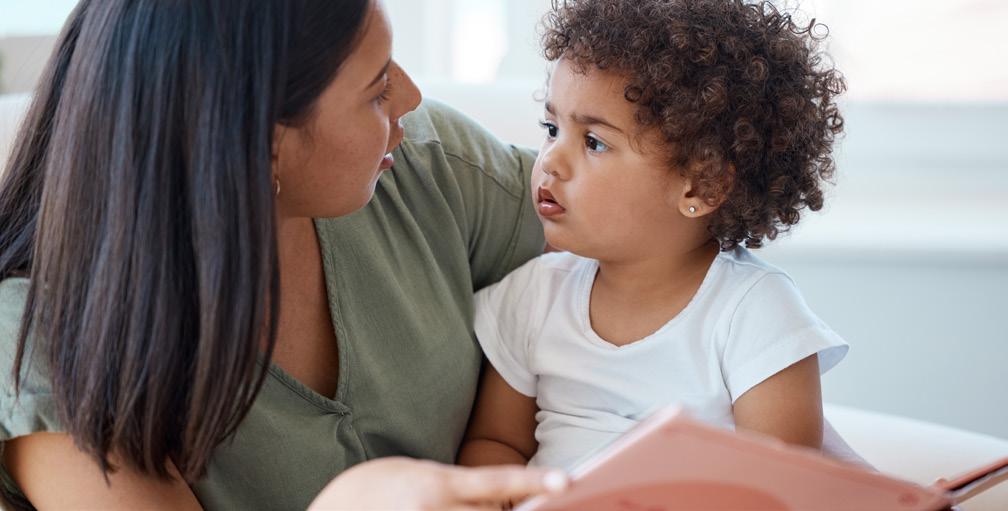
Helping your child at home
Minimise background noise and speak face to face so your child can watch your lips while you talk. This gives them visual cues for how you say things;
Provide simple, short instructions. Note that children ages 2 to 4 can only hold two pieces of information in their brain at one time;
Allow extra time for your child to process information and ask what they understood;
Always ask your child to repeat mispronounced words - in a fun way;
Bedtime audio books help with following stories and engaging with auditory material;
Children are often tired at the end of the school day and it’s exhausting listening to specific information through competing background sounds;
Understand that when phonics are in place, your child may not be able to ‘blend’ sounds with ease and may need more practice;
Show your child’s school the completed questionnaire at www.bit.ly/AuditoryProcessingQ
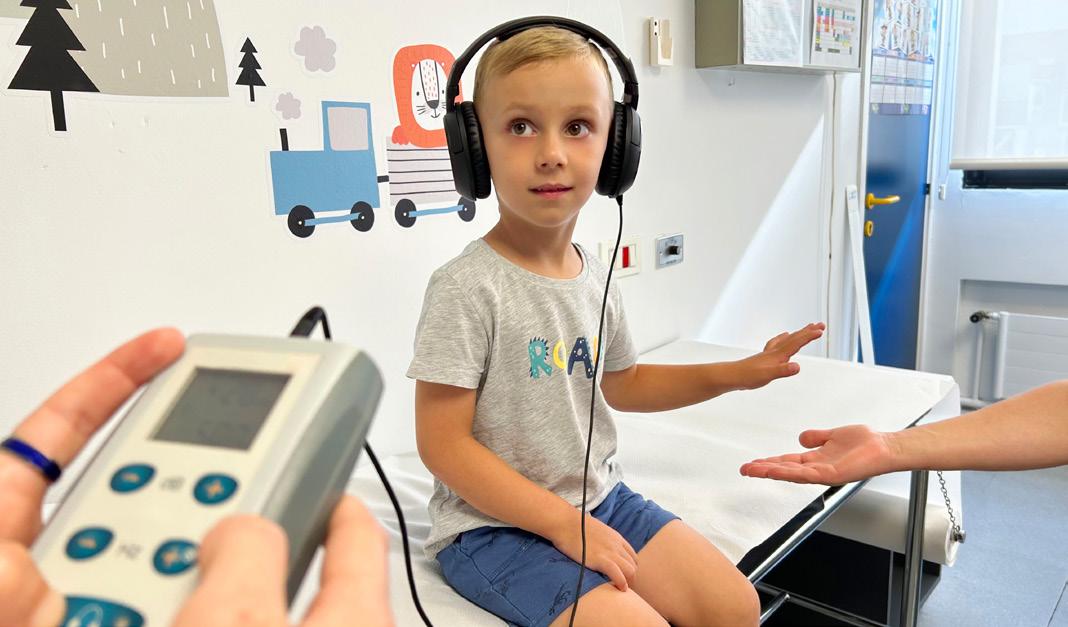
Children with APD have also been observed to:
Have trouble paying attention to and remembering information presented orally;
Have problems carrying out multi-step directions and need more time;
Misunderstand what is said and ask for instructions to be repeated;
Have language difficulty and language delay (eg they confuse syllable sequences and have problems developing vocabulary and understanding language);
Appear to have behaviour problems, often because they are not complying with given instructions;
Have difficulties retrieving spellings because they struggle to remember the sounds.
The Raviv Practice London (www.ravivpracticelondon.co.uk) offers a structured language programme for APD called Fast ForWord (FFW), a computer based learning programme based on twenty five years of research. FFW can be used anywhere in the UK. Screen your child with a FREE questionnaire at www.bit.ly/AuditoryProcessingQ

Familiesonline.co.uk Families Manchester 7 EDUCATION
Developing a positive attitude towards learning
By Gail Hugman
No matter how skilled or knowledgeable a person might be, their attitude may well be the deciding factor in their future success, both personal and professional. Recent neuroscience has discovered the crucial role a positive attitude plays in the learning process, particularly during the primary years.
The second a child is born, their brain, with roughly eighty six billion neurons or nerve cells, ‘hits the ground running’ making connections through senses and experience. Everything a young child does, feels, hears and sees creates pathways between these nerve cells, building a reference bank of experience.
In the first three years, the connections the brain makes have risen to one thousand trillion. This is an automatic process. Ninety percent of brain development is complete by the time a child is 5 years old.
Although there is a default setting for the brain to function whether we engage or not, when it comes to learning, children who are actively engaged in the learning process are going to be far more effective and therefore, higher achieving than their peers who are simply ‘going through the motions’ of learning. The child who loves practising the guitar is going to progress more quickly than the child who battles with you or resents practising!
The reason for this is that as we grow, the brain takes its lead from what we do repeatedly. Where we make a conscious decision to put effort is where the brain will focus connections.

Reversing a negative attitude
Start with a clean slate. From now on, LISTEN to what your child has to say without interrupting, judging or criticising. Listen without looking for a solution. This may mean ignoring the sullen tone of voice and complaint that can come first.
Recognise that, up to puberty, children are based in feelings. Their brain is unlikely to have enough experience or references to express the negative feeling which has caused the attitude change.
Demonstrate empathy and understanding. Be available to help your child deal with the inner conflict they feel.
Be prepared to make changes: in routine, in practical ways and even in yourself, if necessary.
We are born to be positive and grow. When your child can explain and get help with the contradictions of their world experience, it’s amazing how quickly a positive attitude can be recovered.

Children who enjoy what they’re doing, who love learning and who have a positive attitude, actively engage. Active engagement creates the signal for the connections the brain makes to be ‘cemented’ in myelin, a coating of fat and protein which make them ‘automatic.’ This is how learning is assimilated and habits are created.
The brain doesn’t know whether what a child is doing is good or not, it just takes its lead from repetitious behaviour and feedback from their surroundings, in this case, parents and teachers. The more positive a child’s attitude, the more positive the connections and growth they make, which can lead to excellence in performance.
Gail Hugman is a teaching and learning expert at Lessons Alive (www.lessonsalive.com) and author of 100 Things to Learn Before You’re 10, plus the soon to be published Making the Pennies Drop – Helping your Child Build Skills. Available from Amazon.

Harnessing your child’s positivity
Encourage your child to be independent by teaching them skills. Start with self-control and move on to organisation, planning and taking responsibility. Children love to have a positive, personal development reason for what they do that both has meaning for them and brings results.
Children don’t assume. Choose a regular date for a hot chocolate or breakfast alone together. We suggest once a month. Clear everything to listen to how your child is getting on. This validates them and tells them they matter enough for you to make space to talk to them.
If you can’t listen ‘right now,’ tell them when you will. Children are quite happy to wait until they have your attention if you let them know when that will be.
Recognise effort. A child once told me I could photocopy a blank sheet of paper to help the school budget. I loved his creative thinking, took him to the photocopier and explained in a warm and friendly way the reason why that idea wouldn’t work!
Familiesonline.co.uk Families Manchester 8 EDUCATION
Handling toddler sleep challenges
By Heidi Skudder
After the baby months of feeding, getting to grips with naps and developing a routine and then finally moving onto solids, you’d think that the first year would be the hardest when it comes to sleep right!?
Wrong! Toddlers are notorious for their sleep challenges and whilst you may have had a baby who napped well and slept through the night, it is not unusual for this all to change in their second year and beyond – welcome to toddlerhood!
Sleep for toddlers is complex. It’s not just about making sure they are well fed and awake for long enough during the day but also whether they’ve had enough of your attention to not crave it at night as well. Cue multiple visits to your bedroom once they can get out of their bed!
Nightmares
For many toddlers, imagination kicks in from around the age of two. This can bring genuine fears of the dark, monsters or anything else their little brain has convinced them is scary. This makes dropping off to sleep difficult and they may wake and need your support during the night to settle down again.
Reading comforting books together, favourite teddies or dolls and limiting TV exposure can be really useful, as can keeping a warm red or orange night light on for them.
Bedtime resistance
Another key stage in a toddler’s development arrives as they start to realise that they do, in fact, possess the language and control to be able to delay going to bed. ‘One more story, two more songs, I want milk, I need a wee’ have been commonly heard by many a toddler parent!
Whilst this is a phase and happens to the vast majority of parents, it is important to consider sticking to your boundaries during this period so that bedtime doesn’t start to become a two hour process. We speak to many parents who feel that they have lost control and that their toddler now dictates everything about their bedtime routine.
Co-sleeping
And then of course, there is the idea that maybe they just want to be close to you.
Night terrors

Common in times of change or after bouts of illness, night terrors usually occur in the earlier half of the night. Your child will appear to be but is not ACTUALLY awake. They may talk, scream, thrash around, have their eyes closed or be fixated on a point in the room.
Keep the area safe and ensure they don’t hurt themselves but try not to purposefully wake them up. The night terror will pass and they won’t remember it in the morning.

Sleeping in the same bed is considered normal in many cultures. The number of parents who are happy with this arrangement in the UK varies hugely. Whilst some are very pro co-sleeping, others prefer separate beds and the prospect of a better night’s sleep without being kicked by little limbs. When it comes to night time sleeping arrangements, it is the best approach for your family that counts.
The common theme around sleep for both for babies and toddlers is consistency and some parents struggle with this. Whether you help your toddler fall asleep or ask them to settle to sleep on their own, it is the consistency of whatever approach you take that helps sleep along.
Doing different things, at different times of night, can be really confusing for a toddler and this can lead to multiple night wakes and confusion. Your best bet? Choose one approach to sleep and stick with it. Then the whole family will get a better night’s sleep.
Heidi Skudder is a Sleep Expert and founder of Positively Parenthood (ww.positivelyparenthood.com) She is also a regular speaker at The Baby Show (www.thebabyshow.co.uk) taking place in London in March and October, Birmingham in May and Manchester in June.

Visual charts

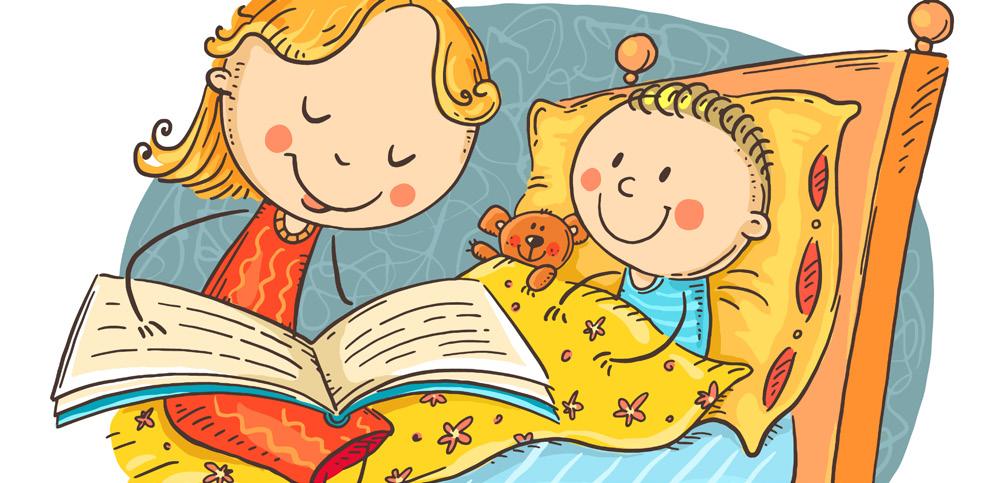
Visual charts can be a brilliant aid in dealing with the pushback on bedtime. With a pictorial bedtime routine on a wall in your toddler’s room, you can refer back to it at trickier points of the evening.
If your toddler is asking for one more story, you can say ‘let’s look at your chart and see how many stories we have!’ It gives them a point of reference and a sense of being in control, which is so much of what a toddler strives for.
Familiesonline.co.uk Families Manchester 9 EARLY YEARS
Get our digital mag! Sign up at familiesmag.co.uk/go
Blooming marvellous spring walks
There’s nothing better than a walk outdoors in the springtime. It’s when the world is starting to awaken from its winter slumber and colour starts to reappear amongst the flora that surrounds you. The Outdoor Guide (www.theoutdoorguide.co.uk) has selected for Families some of its favourite walks from across the UK - walks that make a springtime stroll a perfect family outing.
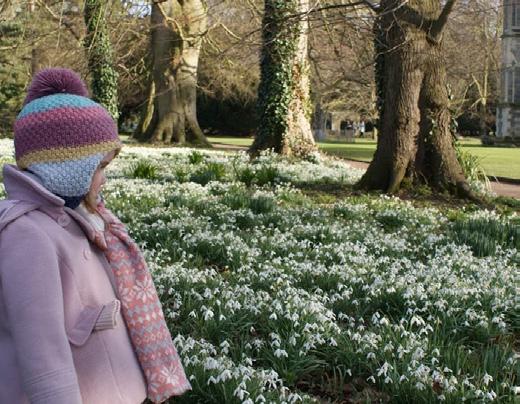
Springtastic Walk, Walsingham, Norfolk
This is a magical walk in the heart of Norfolk and perfect for springtime. From the snowdrops in February through to the bluebells in May, this walk offers enchanting sights and is loved by children and adults alike! www.bit.ly/walsinghamW

Colby Woodland Garden, Pembrokeshire
This is a lovely walk any time of the year but especially in the spring when the garden is ablaze with rhododendrons, magnolias, azaleas and camellias, underplanted with bluebells.
www.bit.ly/colbyG

Ambleside to Grasmere Coffin, Lake District
This lovely walk, at just over six kilometres, offers some great views out across Rydal Water. Take in sights of Rydal Mount, former home of William Wordsworth, as you approach Rydal Water. It’s worth taking a moment to stop here to admire the gardens and their celebrated carpet of golden daffodils.
www.bit.ly/amblesideC


Brownsea Island, Dorset
Located in the middle of Poole Harbour, Brownsea Island is famed for being the home of the Scout Movement. But did you also know that in the 1920s it was also home to a thriving daffodil industry? In the spring, you’ll still see many of these flowers, as a reminder of days gone by. Brownsea Island reopens to visitors in mid March after a winter break and is a wonderful destination for a day of exploring!
www.bit.ly/brownseaD

Redwood Grove & The Spinney, Coombe Country Park, Coventry
This walk is perfect for the springtime as everything comes to life in both the formal gardens and in the wilder spaces. The walk is just under two kilometres in length and is suitable for all the family, including the dog (signs show where dogs needs to be kept on the lead and where they can run free).
www.bit.ly/redwoodS

Dartmoor Moorland Walk, Devon
With over four hundred miles of public rights of way, Dartmoor has a great selection of walks for all the family. This one, at just over ten kilometres, is a great walk for families with older children, that takes in some of the most magnificent corners of the rugged landscape on offer. The trail runs through Holwell Lawn which, during the spring, is carpeted with beautiful bluebells.
www.bit.ly/dartmoorM

Farndale Daffodil Walk, Yorkshire
This is a walk that really must be undertaken in the spring (especially late March into early April). It’s in the beautiful valley of Farndale in the North York Moors National Park and, as the name suggests, will take you through areas full of beautiful wild daffodils.
www.bit.ly/farndaleD

The Knock, Crieff, Perthshire
As you head up The Knock, you’ll be walking through woodland in an area that is rich in important native species, including yellow pimpernel, wood sorrel and barren strawberry tormentil so do keep the family to the path to help protect what is growing around you.
www.bit.ly/crieffK
The Outdoor Guide (www.theoutdoorguide.co.uk) showcases brilliant, tried-and-tested Ordnance Survey mapped walks for all ages, including a section specially for families. Its foundation (www.theoutdoorguidefoundation.org) aims to make the outdoors accessible to all children via the Waterproof and Wellies project.
OUTDOORS
© The Outdoor Guide
© The Outdoor Guide
© The Outdoor Guide
© Holly Barber
© Holly Brega
© Studio 21 Crieff Hydro
Familiesonline.co.uk Families Manchester 10
© Jonny Gios
© Nick Fewings
A year of nature activities
By Catherine Hughes and Becky Goddard-Hill
The impact of nature on wellbeing is well documented and getting children outside is proven to boost both their physical and mental health. But how do you incentivise them with different, exciting, low cost and eco-friendly outdoor activities all year round? Think crafts, science experiments, scavenger hunts, beach and camping games and so much more.
Here a just few nature activities you may want to take with you to liven up your next outdoor adventures as a family.
WHAT’S IN THE BAG?
Pop an object or two in your backpack as you walk and have the rest of your group ask questions to try and guess what it is. You can tell them the first letter of the object and they get ten questions to ask about it - to which you can only answer ‘yes’ or ‘no’.
Will they work it out or will you have to tell them? Best not to take anything too heavy or it will feel like a long walk!
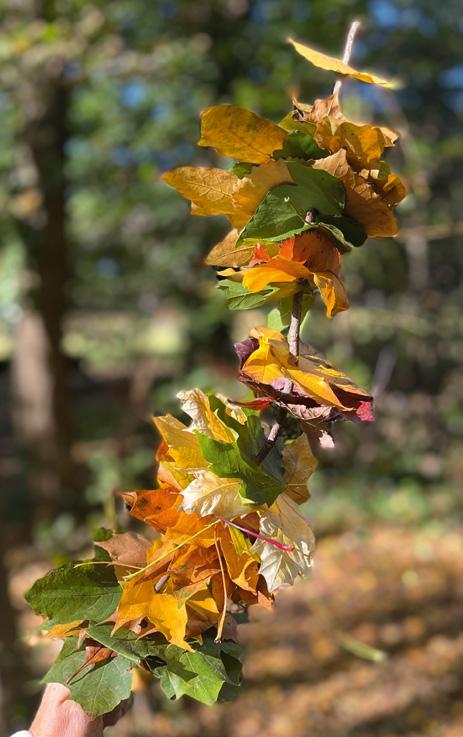
MAKE A LEAF WAND
At the start of your walk find a long, slim but strong stick. As you walk, thread on the best leaves that you find. You might want to go for all large leaves or all orange leaves or maybe a mix. Encourage every member of your family to do the same – you’ll be surprised how different all your wands look. On your return, arrange your leaf wands into a vase for a beautiful display.
If you have a neighbour or older relative who doesn’t get out much, consider gifting them a leaf wand to bring a bit of nature’s treasure into their home.

LETTER OBSERVATION GAME
Each person chooses a letter from the alphabet and tries to spot things beginning with that letter, as they walk. Tally up how many you things you find and see who spots the most.
Because this can be tricky for younger children, it is fine to use descriptive words too so if you have chosen B for example, you could say ‘blue sky’ or ‘big tree.’ Or just ‘bench’ if everyone’s ready for a sit-down rest!
You may want to specify that each descriptive word can only be used once, as well as taking a notebook to keep track of your spots.
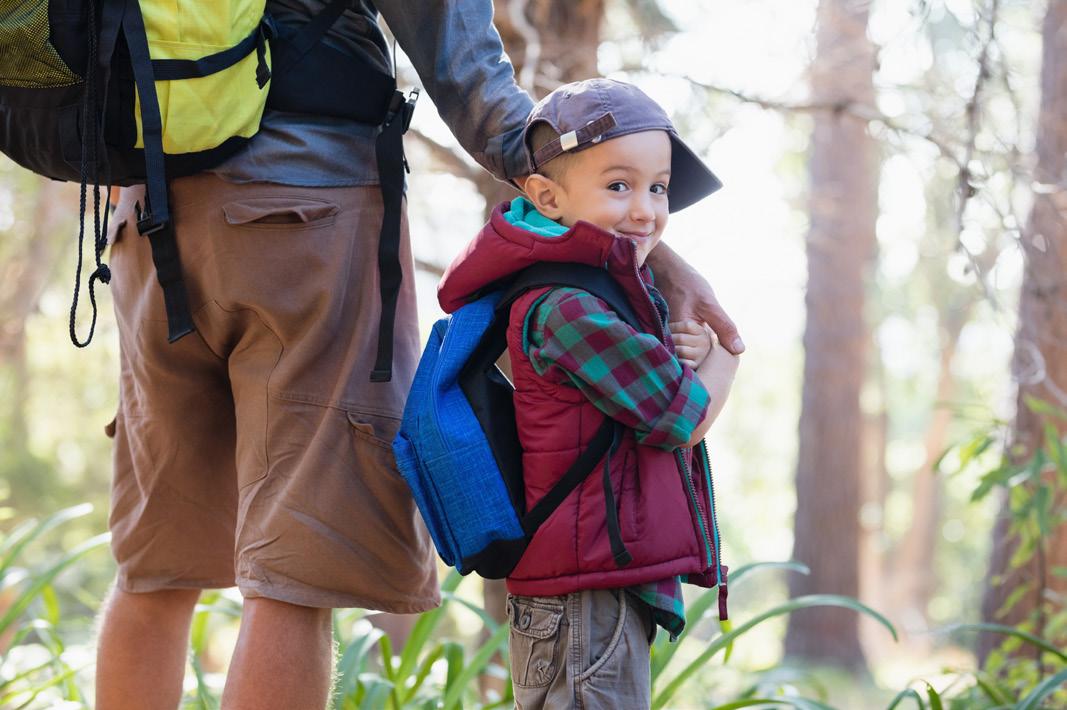
THREE FUN NATURE CHALLENGES
For each challenge, make sure you agree on a ‘base’ before you start.
Find five stones, then bring them back to base and see if you can use them to build a tower that doesn’t fall over.
Choose a marker such as a particular tree. Balance your paper cup on your head and walk to the marker, then try walking back to base without the cup falling off your head.
Find some twigs, bring them back to base and use them to form the first letter of your name (or your whole name if you want a bigger challenge).
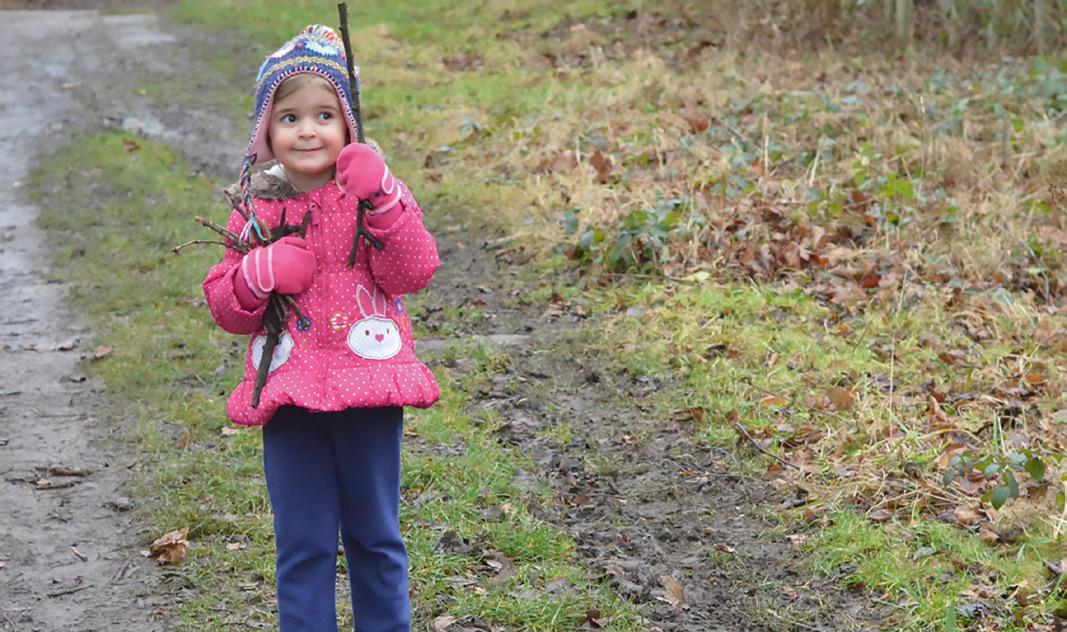
Catherine Hughes and Becky Goddard-Hill are co-authors of A Year of Nature Walks and Games, a book packed full of ideas to keep kids entertained in the great outdoors all year long. It features crafts, science experiments, scavenger hunts, beach and camping games plus lots and lots of ideas on how to make the great outdoors inspiring. Available from good book stores and online retailers.



Familiesonline.co.uk Families Manchester 11 OUTDOORS
Never want to miss another issue? SIGN UP NOW IT’S FREE
Is it ever okay to… shout at your child?
By Ellie Malt
Parenting norms change over time. For example, in 2024 most parents would agree that hitting your child is unacceptable. Has shouting gone the same way? Or is it okay to express your frustration by raising your voice? If you shout but wish you didn’t, here are some tips to help you keep your cool. But first, two different mums share their perspectives.
‘It’s perfectly normal and natural to shout sometimes’
‘Shouting is something I want to avoid as much as possible’

Sometimes I shout at my children and I really think it’s okay. My child is growing up in a world where people shout and pretending that the world is one long festival of peace will only set them up for a shock. Once they start work as an adult, they are unlikely to avoid ever being shouted at. Even in school, they will get shouted at. I remember a PE teacher who just couldn’t hide his frustration when I forgot my PE kit. The shouting was upsetting but even the calmest adults have limits to their patience and children need to understand that they can survive and thrive in a word where that happens.
Faced with the typical toddler’s stream of daily questions, along with the sleep deprivation that comes with parenting, who isn’t going to find their patience strained? It’s perfectly normal and natural to shout sometimes. Not every parent can maintain a supernatural level of calm and sometimes shouting is an expression of how much they care. Shouting at your child when they are about to step out into a busy road could save their life. But even less black and white situations might call for some way to release your frustration and personally I think it’s better than falling back on other less honest ways of venting your emotions like sarcasm, sulking or passive aggression.
Jade, mum of two girls, from Wiltshire
Staying calm
Pausing is key. No matter how frustrated, it’s preferable to resist responding at all until your emotional storm has calmed.
Counting and breathing techniques are tried and tested ways to create an immediate pause in the conversation and slow down the release of cortisol and adrenalin.
It’s important to notice and learn the physical sensations that signal that you are losing your temper. As you get better at this you will get better at stepping back earlier in the process.
When I shout, it feels like a failure and I always regret it afterwards. For me, that’s all the evidence I need that shouting is something to avoid as much as possible. I also don’t like it when my children shout and always pull them up for doing it. But I can hardly expect them to learn to stay calm if I’m not setting an example.
I’ve tried to get better at keeping my emotions under control by breathing and counting. I believe this has helped the whole family to stay calm and keep talking until we reach common ground, instead of raising our voices. More than that, it helps me to slow down and wait for longer while my children figure out what it is they really want to say. I listen for longer without interrupting to try and understand what it is they are really trying to tell me. If they shout, it’s not my job to shout back at them; I see it as my chance to show them there is a better way. I want my kids to respect me, not do as they are told because they are scared of me.
At the end of the day, if we’ve got to boiling point, taking some time out away from each other seems like a preferable option to just standing there, shouting our heads off at each other.
Sue, mum of three, from Nottingham
Where to get help
From dancing to puppetry with soft toys, Hand in Hand Parenting (www.handinhandparenting.org) offers tonnes of ideas for diffusing moments of tension and anger with younger children.
Meditation is one of the few activities proven to reduce the reactivity of the brain to stress, if practised consistently over a period of time. Headspace (www.headspace.com) has meditations designed specifically for parents.
The Calm and Confident Parenting Club (Facebook @calmparent) offers video tutorials including a two minute technique for releasing tension: https://vimeo. com/800838958
Familiesonline.co.uk Families Manchester 12 PARENTING
Is gaming truly a villain?
By Dr Amit Sra and Vivek Behi
According to a recent survey, a staggering ninety one percent of children ages 3 to 15 play video games on a device.* This gives rise to concerns about potential gaming addiction, the impact on children’s social skills and the presence of seemingly violent or inappropriate content, all of which contribute to parents’ unease about their children’s gaming behaviours. But what if we challenged the notion that gaming is the villain?
In our view, there are often-overlooked advantages of gaming for children. Here are some of the key benefits for young minds and some guidance for parents on ensuring a safe and enjoyable gaming experience.
Despite the common perception of gaming as a mere pastime, recent research underscores the significant impact of strategic and puzzle-solving games on cognitive functions. By enhancing problem-solving, critical thinking and spatial awareness, these games are more than entertainment. They actively stimulate creativity and imagination, with many titles encouraging players to construct their own virtual realms and narratives. These activities lead to cognitive advantages that translate into reallife problem-solving and creative thinking, providing a mental exercise with practical applications.
With the rise of online multiplayer games, our children have the opportunity to interact and collaborate with peers from diverse backgrounds.
Many video games involve multiplayer modes or online communities, enabling social interaction and collaboration. Engaging with others in a virtual environment can help children develop social skills, teamwork and a sense of camaraderie,

Tips for in-game purchases
In numerous games, it is now typical to find in-app purchases and microtransactions. It is essential to initiate open and positive conversations with your child regarding responsible spending in these gaming scenarios. Prompt them to grasp the significance of money and recognise the possible repercussions of unauthorised in-game purchases. Establish boundaries on their spending over specific periods and emphasise the importance of seeking permission before making any purchases. This approach ensures that gaming remains an enjoyable and educational experience while instilling vital financial lessons to safeguard against unforeseen expenses.
As well as discussing responsible spending with your child, educate them on the concept of virtual economies within games. Explain how in-game currencies work and the importance of distinguishing between virtual and real-world money. Emphasise the satisfaction of patience and earning rewards through gameplay rather than resorting to instant purchases. By instilling these values, you empower your child to make informed decisions, fostering financial responsibility and enhancing their overall gaming experience.

while being part of gaming communities can create a sense of belonging for children, especially those who may feel isolated in other aspects of their lives.
Despite the benefits, protecting your child’s online experiences is a top priority as a parent. Creating a secure and enjoyable gaming environment for your kids is crucial to them gaining from the advantages. Like films, games come with age ratings. The Pan European Game Information (PEGI) system provides detailed age ratings to help parents determine the suitability of a video game for their child.
As long as parents ensure children are engaging responsibly, gaming can be more than a hobby. It serves as a valuable avenue for children to learn, develop and forge connections in today’s digital landscape.
Dr Sra and Mr Behl are owners of the youth esports arena Valhallan (www.valhallan.com), which offers a secure and nurturing environment in which children can foster their love of gaming.

Further gaming benefits
Video games often receive criticism for their perceived impact on our children’s mental health but the reality is that their influence on child development is frequently misunderstood.
Beyond mere entertainment, gaming is a powerful training tool for a range of essential skills. Engaging in virtual adventures or competitive game challenges provides children with a unique opportunity to relax and develop emotional resilience. Immersive gameplay allows children to escape momentarily from real-life pressures and challenges, providing a sense of relaxation and escapism. Certain video games often include objectives and rewards, teaching children the value of setting goals and working towards them, while achieving in-game milestones can boost self-esteem and motivation.
Some games go a step further by offering players a chance to improve their emotional regulation and decision-making skills in high-pressure situations; skills that easily transfer to real-life scenarios. In essence, gaming provides a constructive way for your child to relieve stress, giving them space to unwind and acquire coping skills that will be significant for their overall personal development.
Familiesonline.co.uk Families Manchester 13 PARENTING
WHAT’S ON
What's On
All listings are correct at the time of publication. Please check with the venue before you visit in case anything has changed.
DIARY DATES
11-17 March
Altrincham Garrick Theatre –Cinderella A Spring Pantomime Performed by Garrick Academy of Performing Arts students.
www.altrinchamgarrick.co.uk/ shows/gapacinders
17 March
Lowry Salford – The (Not So) Big Bad Wolf
Little Red Riding Hood here! Stay tuned as I go undercover to reveal the truth behind fairytales’ most infamous villain.
www.thelowry.com/whats-on/thenot-so-big-bad-wolf
20 March to 20 April
Dunham Massey – Easter Adventures Trial
The trail features 10 activity stations. Follow a route that takes in the medieval deer park, 400-yearold mill and extensive gardens. Enjoy a picnic on the lawn or go fallow deer spotting across the 300 acre parkland. Every trail includes a chocolate egg or ‘Free-From’ egg, made in the UK using cocoa from Rainforest Alliance Certified farms. www.nationaltrust.org.uk/visit/ cheshire-greater-manchester/ dunham-massey/events

23 March
Waterside Manchester – Alice in Wonderland
Filled with live music, puppetry and hilarious characters, Folksy Theatre deliver the perfect show for the family.
www.manchestertheatres.com/ event/alice-in-wonderland
26 to 30 March
The Lowry, Salford- The Boy At The Back Of The Class
Told from a child’s perspective, balancing heart and humour this show highlights the power of friendship and kindness in a world that doesn’t always make sense and reminds us that everyone needs a place to call home. www.thelowry.com/whats-on/theboy-at-the-back-of-the-class
28 to 30 March
The Octagon Bolton – Spot’s Birthday Party
With party hats, songs, dancing and lots of interactive party games, this is going to be the best birthday party ever!
www.octagonbolton.co.uk/ events/spots-birthday-party

machines create a fantastic day out.
Until 14 April: See Little Grey Fergie At The Farm
Say hello to Little Grey Fergie, the clever little tractor who can move all by himself!
Until 23 June: Shaun the Sheep Colourful arts trail. www.tattonpark.org.uk
29 March
Queen Elizabeth Hall Oldham –Robin Hood Easter Pantomime www.ticketsource.co.uk/whatson/oldham/queen-elizabeth-hall/ robin-hood/e-bkydzo
29 to 30 March
Z Arts Manchester – There’s A Monster In Your Show!

Tom Fletcher’s interactive adventures for big imaginations are leaping from page to stage, as the beloved ‘Who’s in Your Book?’ series makes its debut as a brandnew musical show.
www.manchestertheatres.com/ whatson/family
29 March to 1 April
Cockfields Farm Ashton under lyne – Meet The Dinosaurs! Dinos are on the farm! For a fantastic day full of activities and dinosaurs roaming free. www.cockfields.co.uk
29 March to 14 April
The Giant Easter Egg Hunt at RHS Garden Bridgewater
Find all the larger-than-life hand painted eggs hidden around the
garden to win a FREE chocolatey treat from NOMO - The UK’s No. 1 Vegan and ‘Free-From’ chocolate brand. Enjoy craft activities, storytelling, a bird spotter trail and family outdoor theatre fun.
www.rhs.org.uk/bridgewater
30 March
The Lowry, Salford – MC Grammar Live Stop! It’s Grammar Time!
Wowza! Multi award-winning rapping teacher and World Book Day Ambassador, MC GRAMMAR is live and in the house!
www.thelowry.com/whats-on/mcgrammar-live-stop-its-grammartime
30 & 31 March
Buxton Opera House – Peppa Pig’s Fun Day Out
Join Peppa, along with her family and friends as they go to the zoo and also the beach for a special party- it’s going to be an exciting and fun packed day.
www.buxtonoperahouse.org.uk/ event/peppa-pigs-fun-day-out
31 March
The Albert Halls Bolton – Trouble on Volcano Island/Dinosaur Show Live
Join the intrepid Dinosaur Adventurers as they journey to a world of living, breathing, life-like dinosaurs.
www.manchestertheatres.com/ whatson/family



The Giant Easter Egg Hunt at RHS Garden Bridgewater
Join RHS Garden Bridgewater from 29 March to 14 April and search the garden to find giant decorated eggs. Find them all and receive a FREE chocolatey treat.
It’s been a long winter but warmer days are on the way and RHS Garden Bridgewater is springing to life. Enjoy swathes of cheery daffodils in the Orchard Garden and snowdrops in Middle Wood, along with the dainty hues of Iris reticulata and blossom in the Paradise Garden.
Plan your visit at www.rhs.org.uk/bridgewater
Familiesonline.co.uk Families Manchester 14
CLIMBING SOFT PLAY PARTIES & MORE! WWW.ROCK-UP.CO.UK START YOUR ADVENTURE
31 March to 1 April
Bury Transport Museum - Peter Rabbit Family Fun Day
Say hello to Peter as he meets, greets and entertains at intervals throughout the day with no additional cost to admission. www.manchestertheatres.com/ whatson/family
1 April Buxton Cinema/Pavilion Arts Centre - Soul PG showing of Soul! www.buxtonoperahouse.org.uk/ event/soul-pg
2 to 4 April
Brindley Theatre RuncornGoldilocks And The Amazing Three Bears Spring Pantomime with fabulous circus acts. www.thebrindley.org.uk
2 to 7 April
The Lowry, Salford – The Gruffalo’s Child
One wild and windy night the Gruffalo’s Child ignores her father’s warnings about the Big Bad Mouse and tiptoes out into the deep dark wood. She follows snowy tracks and encounters mysterious creatures – but the Big Bad Mouse doesn’t really exist… does he? www.thelowry.com/whats-on/ the-gruffalos-child
3 April Storyhouse Theatre Chester –The Sooty Show
Celebrating 75 amazing years in show business, Sooty, Sweep and Soo are planning a very special birthday party and you’re all invited. www.storyhouse.com/whats-on/ the-sooty-show
3 to 14 April
Altrincham Garrick Playhouse –Treasure Island
Avast there, me hearties! It’s time to set sail with the Altrincham Garrick Playhouse for an action-packed, swashbuckling adventure on the high seas to Treasure Island! www.manchestertheatres.com/ whatson/family
7 April
Kingsway School Cheadle – Kids Car Boot Kids Car Boot and Swap Shop. www.kidscarboot.co.uk/events/ cheadle-126
7 April Manchester Opera House - Kidz Bop Never Stop!
Sing and dance along with the KIDZ BOP Kids as they perform today’s biggest hits, live on stage. www.manchestertheatres.com/ whatson/family
7 April
Bridgewater Hall Manchester –Paddington In Concert Watch the award-winning 2014 film on a giant HD screen, accompanied by the London Concert Orchestra playing Nick Urata’s calypso-infused score live. www.manchestertheatres.com/ whatson/family
10 April
Middleton Arena Manchester –Dinosaur Adventure Live
This awe-inspiring interactive stage show will immerse audiences in the enthralling and realistic world of dinosaurs.
www.manchestertheatres.com/ whatson/family
10 & 11 April
O2 Apollo Manchester – L.O.L Surprise Live
First ever live show set to dazzle families. The call has gone out… All B.B.s in the UK have been invited to strut their stuff and show off exactly who they are when the L.O.L. Surprise!
www.manchestertheatres.com/ whatson/family
11 April
East Lancashire Railway BuryTravel To Wonderland
You’re late, you’re late, for a very important date! It’s time to take a tumble down the Rabbit Hole for a curious adventure through Wonderland with Alice and friends. www.manchestertheatres.com/ whatson/family
11 April
Buxton Cinema/Pavilion Arts Centre - Luca
PG showing of Disney Pixar’s Luca. www.buxtonoperahouse.org.uk/ event/luca-u
12 to 14 April
Cockfields Farm Ashton under lyne – Falconry Displays
Exciting to have some feathered special guests on the farm. www.cockfields.co.uk
14 April
Brindley Theatre Runcorn –Trouble On Volcano Island
The UK’s biggest dinosaur show. www.thebrindley.org.uk
WHAT’S ON
14 April
Stockport Plaza – Dinosaur Adventure Live
This awe-inspiring interactive stage show will immerse audiences in the enthralling and realistic world of dinosaurs.
www.manchestertheatres.com/ whatson/family
18 to 21 April
Depot Mayfield Manchester –RHS Urban Show
Be part of this new immersive gardening experience. www.rhs.org.uk/shows-events/ rhs-urban-show
18 to 21 April
Manchester Opera House – Awful Auntie!
www.manchestertheatres.com/ whatson/family
20 April
Sugden Sports Centre
Manchester – Northern Vegan Festival
www.eventbrite.co.uk/e/northernvegan-festival-2024-manchestertickets-804031157837
20 April
Bridgewater School Open Morning
EYFS and Prep Open Morning. This provides the perfect opportunity to experience the school’s inclusive and nurturing atmosphere and see for yourself just why children are so happy here. Register your interest, email admin@bwslive.co.uk.
Do you have an event for families or children that you would like to list in our What’s On guide?
If so, email it to:editor@familiesmanchester.co.uk

Familiesonline.co.uk Families Manchester 15 The giant Easter egg hunt Fri 29 Mar – Sun 14 Apr Go on a larger than life egg hunt this Easter at RHS Garden Bridgewater to win a chocolatey treat and discover the garden in all its spring glory. rhs.org.uk/bridgewater JOIN TH E R H S TODAYRHS Members go free JOIN THE R H S TODAY X X RHS Registered Charity No: 222879/SC038262
Be egg hunt ready with our BUN�Y Binoculars!
Hop into the Easter spirit with this delightful craft!
Unleash your little one’s creativity and recycle cardboard tubes to make bunny-shaped binoculars. Are you ready for the hunt?
Let the crafting adventure begin!
You will need:
• Loo roll tubes (x2)
• Cereal box card
• Tape
• Scissors
What to do:


Step 1:
Glue the two tubes together to make binoculars. Leave to dry.

Step 3:
Glue the rest of the template to cereal box card. Once dry, ask a grown up to help you cut out the nose and ears.
• PVA glue
• Colouring materials
• Printed template (scan QR code to download)

Step 2:
Ask a grown up to help you cut out the band from the printed template.

Step 4:
Use glue to attach the nose to one end of the binocular tubes. Leave to dry.


This activity has been provided by toucanBox (www.toucanbox.com) whose all-in-one subscription craft boxes for kids make playtime easy-peasy.

Step 5:
Colour in your band, then wrap around the binoculars and glue tab to secure.

Step 6:
Ask a grown up to help you cut a small slit for each ear, about 1cm away from the end of the tube.

Step 7:
Insert the bunny ear tabs into the slits. Fold the tabs towards you and tape to the inside of the tube.

Familiesonline.co.uk Families Manchester 16
andCutout Keep
SCAN THE QR CODE TO DOWNLOAD THE PRINTED TEMPLATE!
































































